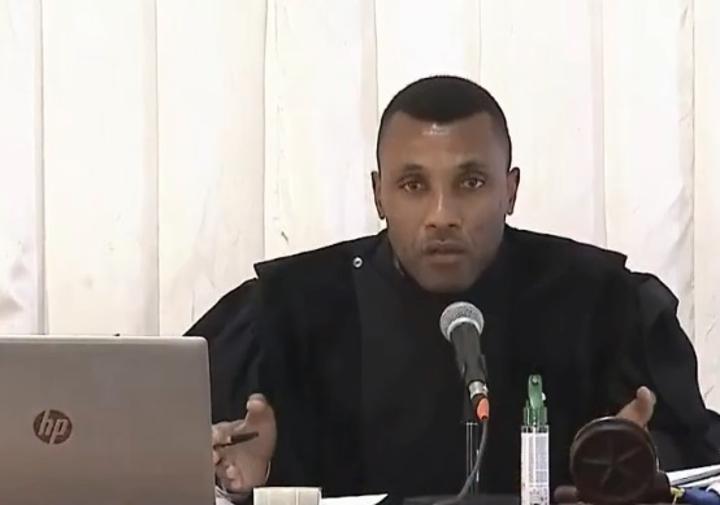Africa-Press – Mozambique. Testifying before the Maputo City Court for the second consecutive day, Gregorio Leao, the former head of the Mozambican Intelligence and Security Service (SISE), refused to answer any questions about the supply and financial contracts for the three fraudulent, security linked companies at the heart of the scandal of the “hidden debts”.
These companies, Proindicus, Ematum (Mozambique Tuna Company) and MAM (Mozambique Asset Management), obtained loans of over 2.2 billion US dollars in 2013 and 2014 from the banks Credit Suisse and VTB of Russia. Those loans were only possible because the government of the time, under former President Armando Guebuza, issued illegal loan guarantees, violating the 2013 and 2014 budget laws.
Financial contracts were signed with the two banks, and supply contracts with the Abu Dhabi based group Privinvest, which was the sole contractor for the three companies. The banks sent the money, not to the companies in Maputo, but directly to Privinvest. Privinvest then sent fishing boats, patrol vessels, radars and other assets to the companies. An independent audit of Proindicus, Ematum and MAM in 2017 showed that Privinvest had grossly overvalued the assets. It had over-invoiced the companies by more than 700 million dollars.
It was the guarantees provided by the Guebuza government that transformed the loans into debts. The guarantees made the Mozambican state liable to repay the loans, if the companies defaulted, as they all have done. Without the guarantees there would be no hidden debts.
In its initial phases, the trial had concentrated on the bribes that Privinvest had paid to Mozambican officials, leading to complaints in some quarters that the prosecution was concentrating on relatively minor sums. But on Tueday, the trial moved to confront the major aspects of the fraud – the contracts signed with Privinvest and the loan guarantees.
These were matters that Gregorio Leao did not want to speak about. When prosecutor Sheila Marrengula asked Leao why turnkey contracts had been signed with Privinvest, under which Privinvest supplied an entire package but without any detailed invoices, specifying what assets were included, he replied that all matters concerning the three companies should be addressed to his co-accused, Antonio do Rosario.
Rosario had been the head of economic intelligence at SISE, and he became the chairperson of the board of all three fraudulent companies.
It was Rosario who knew all the details, he said, so he would not answer questions about how the companies had been run. Over and over again, he told Marrengula to direct her questions to Rosario (who is due to testify on Thursday).
Leao claimed that he had been extremely busy as General Director of SISE, to the extent that he did not even take holidays, and so had delegated tasks to his trusted officials, particularly Rosario.
This applied even to documents he had signed himself. Asked to explain one such document, Leao told the prosecutor to ask Rosario.
“But it’s your signature!”, exclaimed Marrengula.
“I had many tasks at SISE”, said Leao. “The directors advised me, I agreed and I signed”.
Asked whether he knew that the guarantee for the 622 million dollar Credit Suisse loan to Proindicus in 2013 violated the ceiling on loan guarantees set by the budget law of that year, he again passed the buck to Rosario.
This was not some minor irregularity. In 2013, the loan guarantees signed by the then Finance Minister Manuel Chang, when expressed in Mozambican currency, amounted to over 43.4 billion meticais. The ceiling on loan guarantees in the 2013 budget law was 183.5 million meticais. Thus Chang signed guarantees that were 237 times the legal limit.
Sometimes Leao simply refused to answer questions, just as he had on Monday, on the grounds that he was “not authorized” to speak about matters of national security
Occasionally, Leao did make some revealing remarks. He said that in 2013 it was believed that Proindicus would pay for itself and would need no support from the state budget. This would rely on companies operating in the Mozambique Channel to pay for the protection services offered by Proindicus.
In particular, Proindicus expected the foreign companies exploiting the natural gas deposits in the Rovuma Basin, off the coast of the northern province of Cabo Delgado, to pay up.
But no such contracts were signed. Leao said he had been told that contacts were made with the two main foreign companies involved in the Rovuma Basin gas fields at the time, the American Anadarko, and ENI of Italy. He did not know why these contacts had come to nothing.
Perhaps he should have asked some journalists. AIM well remembers a discussion with a senior Anadarko official who peremptorily rejected going along with the Proindicus protection racket. He said Anadarko had no intention of buying services from a recently formed company with no track record of any kind.






